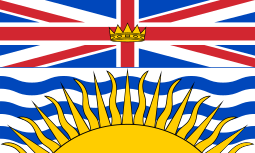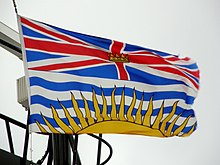Type a search term to find related articles by LIMS subject matter experts gathered from the most trusted and dynamic collaboration tools in the laboratory informatics industry.
 | |
| Use | Civil and state flag |
|---|---|
| Proportion | 3:5 |
| Adopted | 14 June 1960 |
| Design | A white banner with a Union Jack on the top third modified with a golden crown and three wavy blue lines on the bottom, all under a setting golden half-sun on the bottom. |


The flag of British Columbia is based upon the shield of the provincial arms of British Columbia. At the top of the flag is a rendition of the Royal Union Flag, defaced in the centre by a crown, and with a setting sun, a view from parliament across the water at the province capitol, representing the location of the province of British Columbia at the western end of Canada.
From 1870 to 1906, British Columbia was occasionally represented by a modified British blue ensign featuring various forms of the great seal of the Colony of British Columbia.[1] The current flag of British Columbia was based upon the 1906 arms of the province, designed by Arthur John Beanlands, the canon of Christ Church Cathedral.[2] Originally, the arms featured the Union Flag on the bottom. This was changed as it conflicted with the expression "The sun never sets on the British Empire." Based upon Beanlands' revised design, the flag of British Columbia was introduced on June 14, 1960, by Premier W. A. C. Bennett, and was first flown on board the BC Ferries motor vessel Sidney (later Queen of Sidney).
The four wavy white and three wavy blue lines symbolize the province's location between the Pacific Ocean and the Rocky Mountains. The setting sun represents the fact that British Columbia is Canada's westernmost province. The image of the continuously rising sun refers to the provincial motto splendor sine occasu (Latin for 'splendour without diminishment"[3][4][5]')—suggesting the idea that the sun never sets (on the British Empire). The Union Flag on top reflects the province's British heritage, while the crown in the centre represents British Columbia becoming a Crown colony and achieving responsible government. The flag has an aspect ratio of 3:5.[6]
A stylized version of the flag that appears on British Columbia licence plates incorrectly features the setting sun overlapping the Union Flag instead of the waves.
The flag of British Columbia is similar to the flag of the British Indian Ocean Territory. It also bears similarities to the arms of Suffolk County Council, the local authority of the county of Suffolk in the United Kingdom, as well as the flag of Kiribati, which features the blue waves for the Pacific Ocean and a sun for its own reasons.